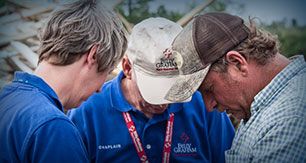When she landed in Australia to volunteer with victims of that country’s devastating wildfires, Calgarian Janet Voth immediately noticed the thick smoke in the air.
Though she never went where the fires were blazing at the time of her three-week term in the country, Voth visited two areas that had been devastated by flames before her arrival. Her three-person response team from Canada provided emotional and spiritual aid to wildfire victims, emergency responders and volunteers.
“We met people who had been evacuated up to five times, so they were traumatized over and over again. We heard stories and saw photographs of the orange sky and flames coming down toward them. We heard stories of the flames reaching their houses and licking through the floorboards of the decks. Some had to run on foot. One took a video of his house being engulfed, knowing he had lost everything,” recalled the rapid response team chaplain.
Much of Australia’s wildfire-ravaged east coast was drenched on Friday by the biggest rainfall in almost 20 years, dousing some of the most dangerous blazes. But since the wildfires started in September, about 11.7 million hectares have been destroyed, killing 33 people and millions of animals, and destroying thousands of homes.
Voth’s team spent most of their time in Bairnsdale and Batemans Bay, south of Sydney in southeast Australia. People shared their anxieties and trauma with them, and they provided support.
The team returned home on Feb. 4.
This kind of nationwide trauma affects everyone in some way, and people need hands-on help in rebuilding their lives, said Voth, but they also need to speak with someone who can work through the trauma with them.
“We sit with homeowners and others, and we help them process the trauma they’re going through. We help them see and walk through that grief. We look for signs where there are more challenges and need to get extra assistance,” said Voth.
The rapid response team is highly trained in Critical Incident Stress Management, an intervention protocol developed specifically for dealing with traumatic events. Voth has years of training and has volunteered in more than 30 deployments internationally, yet she said her time in Australia tested her like none other.
“Because the wildfires hit such a broad area, there’s no one exempt. The work there will go on for months,” said Voth. “The people don’t really understand why they’re feeling the trauma of this. The sooner they can talk and let this out, the sooner they will be able to heal and move forward.”
Voth was volunteering in Australia through the Billy Graham Evangelistic Association of Canada, which sends rapid response teams across the world in response to disasters. The chaplains work closely with Samaritan’s Purse international relief teams that provide spiritual and physical aid to hurting people.
“People would come by and once they understood what we were there to do, we were able to sit alongside them and really listen to people. We listened and showed them love,” said Voth. “When and if the opportunity arises, we have that faith conversation with them. People want to know where God is in something like this.”
People are put in touch with local churches and mental-health support so they continue to receive assistance once the team has left.
Give To Rapid Response Team
